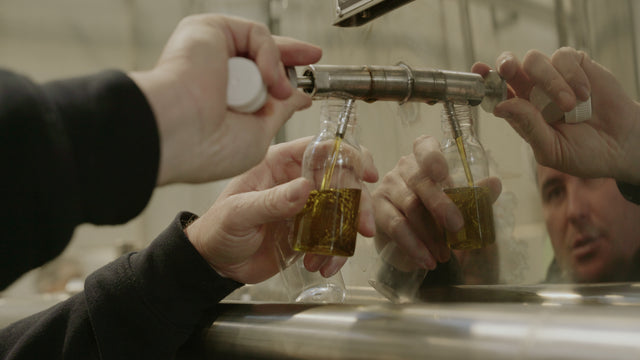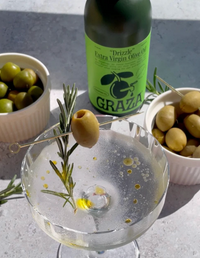
Virgin vs Extra Virgin Olive Oil – What’s the Difference?
With such a wide variety of different olive oil options on the market—and labels busy with distracting buzzwords like "pure" and "cold-pressed"—it can get confusing to know just what it is that you're getting when shopping for olive oil. Here we'll break down the science behind and demystify the difference between olive oils.
How Is Olive Oil Categorized?
Olive oils are classified based on their extraction process and chemical composition. Extra virgin olive is the least refined or processed, followed by virgin olive oil, and then, the most processed - "olive oil."
Let's call it the ~gold~ standard.
The extra virgin label isn't meaningless. Extra virgin olive oil is oil extracted solely through a purely physical or mechanical process—using no chemical solvents or processing. EVOO must also meet a strict testing criteria, which includes a low acidity level (of under 0.8%) and the absence of any sensory defects that affect the taste or smell of the oil.
These standards make sure that extra virgin olive oil retains all those helpful (and tasty) bioactive compounds like antioxidants like polyphenols, vitamins such as Vitamin E in the form of tocopherols, and phytosterols which lower your cholesterol and moisturize the skin. EVOO has the highest polyphenol content of any kind of olive oil—meaning it's chock full of antioxidants which reduce oxidative stress and inflammation in the body, repairing free radical damage and slowing the effects of aging.
Virgin olive oil is mechanically extracted like extra virgin olive oil, but the standards for virgin olive oil are much less rigorous in terms of quality and flavor than EVOO. It can have a higher acidity level (up to 2% as opposed to 0.8%) and sensory defects. It still works to cook with, but you end up losing out the great flavor and enormous nutritional benefits that extra virgin olive oil offers.
How Does Refinement Affect Olive Oil Flavor?
When olives are processed into "virgin" olive oil and regular olive oil, they're often treated and cleaned with chemicals and heated. These refinement processes allow companies to extend the oil's shelf life, but at the cost of the oil's natural health benefits and flavor.
Processed olive oil can have an unpleasant taste compared to a fresh, unprocessed extra virgin olive oil. Real extra virgin olive oil should taste a bit fruity, slightly peppery, and a little bitter—almost like biting into an actual olive.
What About Olive Oils Advertised As Pure or “Light”?
You may have noticed olive oil that doesn't have an extra virgin label, but does advertise being "pure" or "light." Don't fall for it! This refers to a blend of extra virgin olive oil with other processed oils—it's not really a "pure" oil at all. And if you look closely at the label and ingredients, it should tell you that it's a blend.
Meanwhile, "light" refers to the flavor of the oil—not having less calories! Light oils are usually very processed and refined with the goal of being able to heat the oil to higher temperatures. However this requires chemicals, and ends up stripping the color, flavor, and nutrients.
Is Graza's Olive Oil Extra Virgin?
Yup! We only offer extra virgin olive oil that is single origin sourced (meaning the oil in your bottle all comes from olives which were grown on the same farm). It's also never bleached, blended, or processed with chemicals. Get started with some for your kitchen HERE!

















